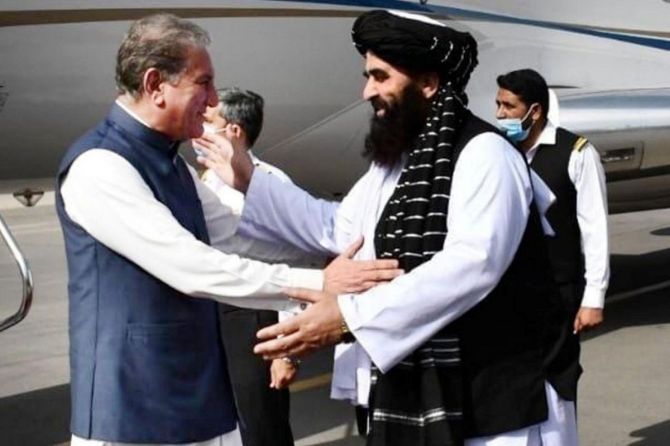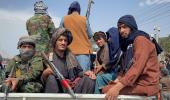Darul Uloom Haqqania madrassa, one of Pakistan's largest and oldest seminaries and dubbed as a 'university of jihad' by its critics for helping sow violence across the region for decades, has educated more Taliban leaders than any school in the world and its alumni now hold key positions in Afghanistan, according to a media report.

The seminary in Pakistan's restive Khyber Pakhtunkhwa province has had an outsize effect in Afghanistan. The seminary's alumni founded the Taliban movement and ruled Afghanistan in the 1990s.
The school has argued that the Taliban should be given the chance to show they have moved beyond their bloody ways since they first ruled Afghanistan two decades ago, The New York Times reported on Friday.
"The world has seen their capabilities to run the country through their victories on both the diplomatic front and on the battlefield," Rashidul Haq Sami, the seminary's vice-chancellor, told the NYT.
Seminary's late chancellor Samiul Haq, who was murdered at his residence in Islamabad in 2018 and was Sami's father, was known as the 'father of the Taliban.'
"Being the alma mater of scores of Taliban leaders, Haqqania certainly commands their respect," said Azmat Abbas, author of Madrassa Mirage: A Contemporary History of Islamic Schools in Pakistan.
Sirajuddin Haqqani, 41, who led much of the Taliban's military efforts and carries a $5 million bounty from the US government on his head, is the new acting interior minister of Afghanistan and an alumnus. So is Amir Khan Muttaqi, the new foreign minister, and Abdul Baqi Haqqani, the higher education minister, the report said.
The justice minister, the chief of the Afghan water and power ministry, and a variety of governors, military commanders and judges also passed through the Haqqania seminary, school administrators say.
"We feel proud that our students in Afghanistan had first broken the Soviet Union and now sent the US packing. It is an honour for the madrasa that its graduates are now ministers and hold high positions in the Taliban government," Sami said.
Many of the alumni adopt the name Haqqani as a symbol of pride.
The Haqqani network -- the Taliban's military wing, responsible for hostage-taking of Americans, complex suicide attacks and targeted assassinations -- is named after the madrasa and retains connections there, the report said.
The Taliban victory in Afghanistan is a source of great pride for the seminary's students.
The school's critics call it a 'university of jihad' and blame it for helping to sow violence across the region for decades.
And they worry that extremist madrassas and the Islamist parties linked to them could be emboldened by the Taliban's victory, potentially fueling further radicalism in Pakistan despite that country's efforts to bring more than 30,000 seminaries under greater government control.
Pakistan has long had an uneasy relationship with madrasas like Haqqania. Leaders who once saw the seminaries as a way to influence events in Afghanistan now see them as a source of conflict within Pakistan.
The country has its own Taliban movement, the Pakistani Taliban, or TTP, which has been responsible for a slew of violent attacks in recent years. The two sides reached a cease-fire this month.
Renewed signs of radicalism in madrassas have appeared, especially since the fall of Kabul, Afghanistan. Students have held pro-Taliban rallies.
At the Red Mosque in Islamabad, the site of a deadly raid by security personnel 14 years ago, Taliban flags were raised above a girls' madrassa next door.
Pakistan's government has tried a mix of financial support and behind-the-scenes prodding to dial down radicalism within the seminaries.
The government of Prime Minister Imran Khan gave the Haqqania seminary $1.6 million in 2018 and $1.7 million in 2017 for 'mainstreaming' it.
The funds helped the madrasa construct a new building, a badminton court and a computer lab, among other projects, the report said.
Haqqania has broadened its curriculum to include English, math and computer science. It demands full documentation from foreign students, including those from Afghanistan, and administrators said it adopted a zero-tolerance policy for anti-state activities, it said.
Experts on education in Pakistan say that the effort has had some success and that Haqqania does not advocate militancy like it once did.
"In an environment of widespread support for the Taliban, both with the government and society, it would be naive to hope that madrassas and other mainstream educational institutions would adopt a teaching approach other than a pro-Taliban one," said author Abbas.
School administrators point to recent statements by some groups in Afghanistan as reflective moderate teachings, the report said. In any case, the world has little choice but to trust the Taliban's ability to govern, Sami said.
"I advise the international community to give a chance to the Taliban to run the country. If they are not allowed to work, there will be a new civil war in Afghanistan, and it will affect the entire region," he said.
Afghanistan has been under Taliban rule since August 15 when the Afghan hardline militant group ousted the elected government of President Ashraf Ghani and forced him to flee the country and take refuge in the UAE.










